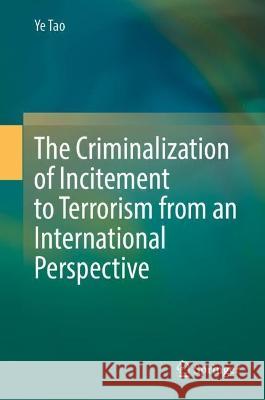The Criminalization of Incitement to Terrorism from an International Perspective » książka
topmenu
The Criminalization of Incitement to Terrorism from an International Perspective
ISBN-13: 9783031343698 / Angielski / Twarda / 2023
The Criminalization of Incitement to Terrorism from an International Perspective
ISBN-13: 9783031343698 / Angielski / Twarda / 2023
cena 563,56
(netto: 536,72 VAT: 5%)
Najniższa cena z 30 dni: 539,74
(netto: 536,72 VAT: 5%)
Najniższa cena z 30 dni: 539,74
Termin realizacji zamówienia:
ok. 16-18 dni roboczych.
ok. 16-18 dni roboczych.
Darmowa dostawa!
This book critically analyzes the criminalization of incitement to terrorism under the fundamental principles of legality, necessity, and proportionality with the aim of striking a fair balance between security and liberty on this complicated issue. The criminalization of incitement to terrorism has gained momentum, but no exact or generally accepted definition of this offense exists at the international level. What’s more, given that the criminalization of incitement to terrorism results in restrictions on the exercise of citizens’ freedom of expression, there should be certain limitations on those criminal measures to avoid unnecessary or disproportionate infringement of this fundamental human right. Nevertheless, there has not been a precise standard by which to determine how to draw the line between anti-terrorism and the protection of freedom of expression. Hence, it could be concluded that the criminalization of incitement to terrorism concerns how to balance security and liberty, and the safeguarding principles of legality, necessity, and proportionality should be fully observed in considering this issue.
This book studies definitions of “incitement”, “terrorism”, and “incitement to terrorism” under the relevant international and national legislation, and points out the existing absence, ambiguousness, or substantive divergence in defining actus reus and mens rea regarding incitement to terrorism. It carefully considers the current need for and essential limitations on criminal measures against incitement to terrorism in accordance with the principles of necessity and proportionality, and particularly focuses on how to balance the protection of freedom of expression with the criminalization of incitement to terrorism. In considering how to draw a line between the two, the book formulates precise requirements for objective and subjective elements of this offense in accordance with the principle of legality.
Given its scope, it will be of interest not only to academics, human rights lawyers and practitioners, but also to policymakers, as it offers an extensive evaluation of the effects and counter-effects of existing criminal measures.











